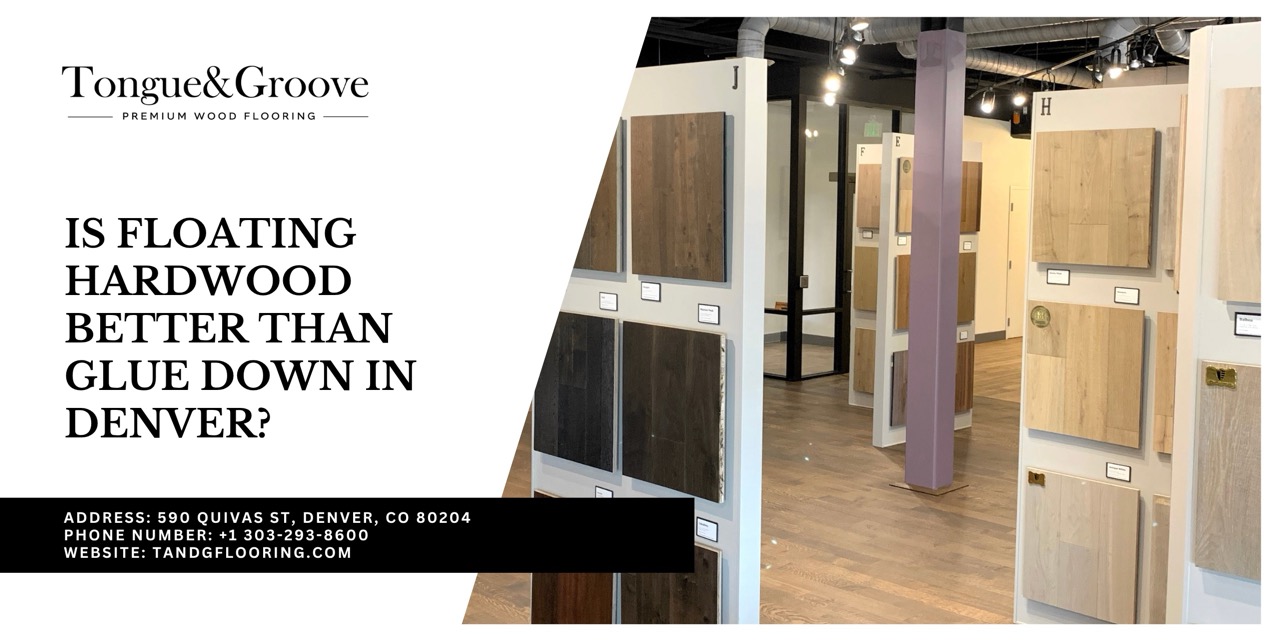Thinking about adding wood floors in Denver for your home? If you are, you’re probably asking: “Is floating hardwood better than glue-down?” The way your flooring is installed makes a difference when it comes to stability, durability and long-term performance. This is especially true when you live in Denver where low humidity and seasonal temperatures affect wood expansion and contraction.
It’s important to understand which method is ideal for your home, subfloor and wood type. With guidance from our wood flooring store in Denver, you’ll enjoy beautiful, long-lasting floors for years to come. Let’s find out if floating or glue-down hardwood flooring is better!
Table of Contents
ToggleWhat is Floating Hardwood Flooring?
Floating hardwood floors are not attached directly to the subfloor. Instead, the boards are connected to each other and “float” above the surface.
It doesn’t take very long to install floating floors and little mess is left behind. This wood flooring installation method in Denver is also DIY-friendly and lets you install over existing flooring.
On the downside, the floors may not feel as solid underfoot because the planks are not secured by an adhesive. Because of this, wide planks or heavy wood species have limited applications and these floors aren’t ideal for high-traffic areas.
Use floating floors when installing engineered wood in smaller rooms or areas without moisture concerns. You can take advantage of the convenience, but you have to remember that this is not the best choice for large spaces or high-traffic areas.
What is Glue-Down Hardwood Flooring?
Unlike its counterpart, glue-down hardwood planks are secured directly to the subfloor with an adhesive.
When you choose this option, you can benefit from stable wood floors with minimal movement and squeaks. You can easily secure wide planks and place the planks over concrete subfloors. Oftentimes, they are compatible with radiant heat systems.
Bear in mind that it might take longer to install these floors and you have to carefully clean up any adhesive. This wood flooring services process makes it less suitable for DIY projects.
The glue-down method is best for installing engineered or solid wood over concrete and wide plank installations. It also allows more stability in high-traffic areas of the home.
Which is Better for Denver’s Climate?
Denver has a dry mountain climate. This can create unique challenges for wood flooring. The lack of humidity can cause the wood to shrink, while seasonal temperature changes can cause expansion and contraction.
- Floating Floors: Be careful as floating floors are vulnerable to movement in dry conditions. This can create gaps or minor cupping.
- Glue-Down Floors: Meanwhile, glue-down installations offer additional stability. It works best over concrete subfloors and in homes with radiant heat.
Understanding how the local climate affects your wood floors is essential. It helps you determine which installation method will give your flat, stable and beautiful wood floors.
Expert Wood Floor Installation Advice
Both floating and glue-down hardwood floors have their unique advantages. The “better” method comes down to your wood species, subfloor, room conditions and lifestyle. However, in Denver, choose glue-down. At Tongue & Groove, we help homeowners make informed decisions when it comes to installing their wood floors. We want your floors to be flat, stable and long-lasting.
Ready to install wood floors in your home? Contact us or visit our Denver showroom to learn more about services!


